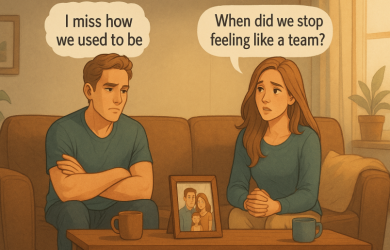25 Warning Signs Your Marriage Is in Trouble

Heal & Grow Daily for a Happier Relationship
Subscribe FREEKey Takeaways
Marriage.com AI Quick Summary
Is there something in the back of your mind that keeps telling you that something is wrong in your relationship? A troubled marriage doesn’t spell the end of your relationship. Acknowledging these signs before it’s too late can actually be a saving grace to you and your partner. If your marriage is important to you, you should never wait too long before doing something about fixing it.
You may think of relationship warning signs your marriage is in trouble as something more obvious like habitually staying late at work or showing signs of having an affair. The truth is, signs your relationship is in trouble could be hiding right under your nose. The changes can be so gradual they are hard to detect.
Don’t be caught off-guard in your relationship.
25 signs that say your marriage is in trouble
Are you worried thinking, “My marriage is falling apart.” Take advantage of these 25 warning signs that you are in a troubled marriage.
1. You can’t let the past go
The marriage vows recite the phrase “for better or worse” for a reason. Marriage has its ups and downs, and some of those downs can be devastating.
However, a couple devoted to one another finds a way to rise above betrayal, annoyances, and hard times and learn to forgive one another for their faults. However, those facing the rocky road of a troubled marriage may find that forgiven follies from days gone by are being brought up repeatedly.
Dredging up old arguments that have already been forgiven is a definite sign that you’re not feeling connected to your partner any longer.
According to Jennifer Jacobsen Schulz, a licensed clinical social worker:
Marriages cannot thrive when one or both partners frequently bring up past feuds, so developing the ability to forgive and move forward is essential for a healthy marital union.
2. You fight about everything
Couples who are parting ways emotionally begin to lack the patience they once had for putting up with one another’s imperfections. If you’re not bringing up old arguments, you seem to have no trouble finding new topics to fight about.
In fact, your arguments are incessant, and you seem to be fighting about the same topics over and over again. From serious issues like money, family planning, and fidelity to those who forgot to throw the empty milk jug in the trash, you now have a treasure trove of nitpicks you can’t seem to let go of.
3. Hiding money
Hiding money from your significant other or having money hidden from you is a bad sign that you are in a struggling marriage.
Hiding money often signifies either that the partner no longer feels comfortable or trusting enough to share their financial situation with their marriage mate. It could also indicate an attempt to privately save up enough funds to move out and pursue a separation.
Hiding finances may also be a way of shielding one partner from seeing out-of-character spending on such things as a hotel room, gifts, or other expenses related to having an affair.
Related Reading: How to Avoid the Money Issues That Can Destroy Your Marriage
4. You don’t make decisions together
A marriage is a partnership. This is two lives coming together and deciding equally how to move forward with important decisions. The moment you shut your partner out of decisions regarding finances, your home, your children, or your relationship should be a monumental red flag.
Related Reading: What Exactly is an Equal Relationship?
5. You start thinking about what-might-have-been
When people are in unhappy relationships, they tend to dwell on the last romantic encounter that made them happy. This could be a summer fling, an ex, or a first love. Some may even start to wonder what kind of life they could have with a close friend or work colleague.
Also Try: Are You In An Unhappy Relationship Quiz
6. Infidelity
While it is normal to notice the opposite sex, there is a big difference between noticing someone is attractive and actually being attracted to them. When you start dwelling on a potential sexual relationship with someone other than your marriage mate you are asking for trouble.
Both men and women cheat for the same reasons: a lack of physical needs are being met or a lack of emotional connection and reassurance. It goes without saying that cheating is beyond the signs of a failing marriage that says your relationship is in trouble.
7. Separate bedrooms
Separate bedrooms may lead to separate lives. Scientifically, physical touch is an important aspect of feeling connected to your partner and can release a burst of oxytocin. It doesn’t matter if this manifests itself through holding hands or spooning in the night. Of course, all of this depends on your personal habits as a couple.
For example, if you have always slept in separate bedrooms due to conflicting work schedules or sleep issues then this would not be a cause for alarm.
8. The sex has dwindled
A change in sexual intimacy is never good for a relationship. Commonly women lose interest in sex with their partners due to a lack of emotional connection, while men lose interest because they are bored.
Either way, a lack of sex is one of the red flags in marriage. Sex is what bonds you as a couple and is one of the things you share exclusively with one another. It triggers the brain to produce oxytocin, relieves stress, and lowers trust barriers put up by the brain.
Related Reading: 4 Signs of a Low Sex Marriage
9. You’re not taking care of yourself anymore
When partners are going through a hard time, they usually stop taking care of themselves. This could mean you stop dying your hair, working out, dressing up. If you haven’t changed out of your pajamas in three days, you are definitely experiencing a slump.
10. You start introducing distractions to hide from your problems
When going through a struggling marriage, many people start to look for “Band-Aid” solutions to cover up the real issues happening in the relationship. Couples may introduce the idea of a wild vacation or even open up the discussion of having children.
Related Reading: Date Nights, Vacations, and Couple Retreats – Why Are They so Important
11. Lack of connection
This is one of the signs of separation in marriage and takes several forms. One of the most common issues that arise is that the couple puts so much emphasis on the children that their relationship suffers.
It often isn’t until the children are grown that the couple realizes how far they have grown apart. When you stop spending time together or stop communicating, it only widens the feeling of separation.
Related Reading: 3 Detrimental Effects of Lack of Communication in Marriage
12. Lack of intimacy
Another tell-tale sign of possible trouble is a lack of intimate connection. Lack of intimacy relates to a lack of touch, hand-holding, kissing, hugging, and sex.
In regards to sex, generally, one partner has a higher sex drive. This in and of itself is not a problem. The problem comes when that partner begins to feel rejected, isolated, unloved, and essentially disconnected from their lower sex drive partner.
13. Infidelity: Emotional and physical affairs (Fantasizing and actualizing)
There are many reasons why someone may choose to stray. Some reasons may be boredom, longing for attention and affection, the excitement of risk-taking, and so on and so forth.
It is common sense that this is a sign of marital trouble. The affair may provide a boost of feel-good chemicals like dopamine temporarily, but it will not transform the marital unhappiness, obviously.
This often makes things worse, eroding what little trust was already there. I have seen people cheat because they want to end things with their spouse and didn’t see another alternative as to how.
This may cause a problem for that person down the line. In states that have “fault” divorces, the act of infidelity increases the likelihood of being sued for damages and may leave that person at a disadvantage in the divorce settlement.
14. Fighting, criticizing, & continual conflict
It is inevitable that two people will not see eye to eye on everything, so disagreements are common and healthy.
However, when conflict becomes the new normal, it is worth taking a step back to observe what is going on. It has become so common in our culture to project our own low moods (anger, sadness, frustration, insecurity) onto others, especially our loved ones, we never stop to question:
- If it really works this way that someone else could make us feel something?
- Is there a better way to soothe ourselves and maintain good feelings in our primary relationship?
Related Reading: 7 Causes for Conflict in Marriage and How to Resolve Them
15. Habitual low-mood interaction
Habitual low-mood interaction can take many forms. It can manifest as continually fighting over the same things or even as an escalation of fighting that borders on verbally abusive (or even physically abusive).
It also can show up in more subtle ways as constant criticism or attempts to change or control your partner’s behavior. It is ripe with judgment and obviously leads to a deterioration of goodwill in the relationship.
If you are on this habit train, jump to a new track if you have any desire at all to make your marriage work.
16. Communication is limited to single-syllable words and/or fighting
I often ask my patients what they would be doing and/or experiencing if they were not so focused on their symptoms (ie-how many times a day they throw up or exercise or smoke pot or panic etc.). Well, the same holds true for couples.
If couples were not fighting, what would they be experiencing? Intimacy perhaps.
Related Reading: The Importance Of Communication In Marriage
17. One or both parties have an addiction
Phil has a sexual addiction. He spends countless hours on the computer watching porn, primarily straight sex porn. Prior to the internet, he had DVD’s- and lots of them. His sex with his wife is non-existent . . he prefers to be alone with his electronics. His marriage to Donna has been troubled for years.
Frankly, both of them, whose communication is dominated by traveling or fighting, are terrorized by the prospect of intimacy and have been so for 35 years. Phil’s relationship with his addiction takes priority, as do others’ unhealthy relationships with food, alcohol, drugs, and work. These are all ways to leave a relationship.
18. The focus is completely child-centered
When there is no space created for the couple, the marriage is on the rocks. Whether it is focused on how to arrange the family hours due to a two-parent working household or how to deal with a sick child, unless there is room for the couple, there is a problem.
This is the case even when you think you are running the family properly and the leadership is great. There is no leadership if there is no couple.
19. A third party takes precedence over your partner
When you seek help from a family member (ie-your mother or a friend) consistently, there is a loyalty breach and an unresolved problem. This is often a deal-breaker.
20. You isolate yourselves and keep your troubles a secret
This is denial. Avoiding social gatherings and showing anything but a lack of pride in your partner is indicative of an unhappy marriage.
21. Sex is not enjoyable at least some of the time
While sex in the family household (marriage and particularly with kids) is not always a passionate affair, again, there should be that sacred space. It requires time and attention.
22. One or both parties are having or are thinking about having an affair
Although affairs sometimes balance out the inequities in a marriage, it will never work long term and certainly not in a healthy marriage. Phil, who I mentioned above, brought a third party into the marriage-an affair, which his wife was aware of. Although she consistently complained, she did nothing to change the situation.
23. One part of the couple has grown, and the other has not
While this is good for one person because growth is important, it may not be good for the couple. If the agreements that were entered into originally change because one party gets healthy, the marriage can no longer work.
24. The distance between you and your partner
The distance between you and your partner is as great as it can be given the geographical boundaries of the bed . . . or the hose connection is built largely on energy and if there is no energy during the sleeping hours, there starts the disconnection.
When we sleep, our soul connects. Sleeping in separate rooms, for whatever reason you choose (i.e., he snores, your child requires an adult in their bed), all result from the need to disconnect.
Related Reading: How Distance in a Marriage Can Damage Your Marital Relationship
25. The distance is as great as it can be outside of the bedroom
You avoid each other. You make excuses to be apart-work travel, social occasions, divide and conquer with the kids.
The energy outside the bedroom is generally more diffused yet still critical on a lot of levels. Underlying resentment, anger, and value differences can trigger distance and weaken the bond.
Other obvious warning signs your marriage is in trouble
Domestic violence and emotional abuse are two dangerous signs that your relationship is in trouble. If you are experiencing abuse at the hand of your married mate, seek out a safe residence to stay at while you plan your separation or begin counseling.
If you see one or more of these signs of a troubled marriage, don’t fret. They are called “warning signs” for a reason. Only when you acknowledge marital problems can you take steps to fix the situation.
How do you fix a troubled marriage
It’s only natural for marriages to hit some rough spots, but some partners report being largely unhappy and disconnected from the marriage for years before they seek some form of help.
It can be a difficult thing to assess if the marriage is in trouble, especially if the level of meaningful communication is minimal.
Related Reading: How to Fix and Save a Broken Marriage
Practices that can save your troubled marriage
With that, disconnected marriages are not uncommon, and there is nothing above that means a couple is doomed and can’t fall back in love. So, how to fix a troubled marriage?
If you see the signs your marriage is failing, check out these practices to solve your marriage problems:
-
Be aware
Gain awareness of the inherent biases that every human being has. Learn the basics of how the brain functions.
Learning how memory works, for instance, or the physical effects of rejection on the body is extremely useful because it allows you to come from a more neutral place in your interactions with your partner.
You will begin to see the innocence in your partner’s actions (and even your own).
-
Be adjusting
It is common to try to fix your partner. However, this is unrealistic. You simply can not control or change another person. But, you can change yourself and that will change your level of happiness.
-
Listen more
More often than not, we tend to speak a lot and not let our partners speak enough. However, the conversation is a two-way street. So, listen as much as you talk. To handle a troubled spouse, let your partner speak their heart out too.
Check out these 4 listening skills that will boost your relationship:
-
Initiate action
Be the one to make the first move. Don’t wait for your partner to come to you. Remember, it’s a relationship, and no one is here to lose and win. It will always be the relationship that wins, no matter who puts a foot forward and makes the first move.
-
Be patient
Be patient in the process of saving your relationship. The results of your efforts will not show overnight. So, keep working together as a team, and eventually, you will find your relationship strengthening.
Takeaway
If you are willing to work on overcoming marriage troubles, you will be able to resolve your marital issues and pave the way for a happier future together.
Dr. Jennifer concludes with:
When a marriage is in trouble, you may benefit from reaching out to a marital therapist, who can provide guidance and a neutral perspective on the challenges you face.
 Tips
Tips
Write your tip or submit a video tip
All tips are reviewed before the publishing.
Share this article on
Recent Articles
Related Quizzes
Heal & Grow Daily for a Happier, Healthier Relationship
Subscribe FREE on YouTube We'd love your feedback!
We'd love your feedback!
 Expert Q&A
Expert Q&A
Ask your question related to this topic & get the support you deserve from experts.





















 Thanks for your feedback!
Thanks for your feedback!